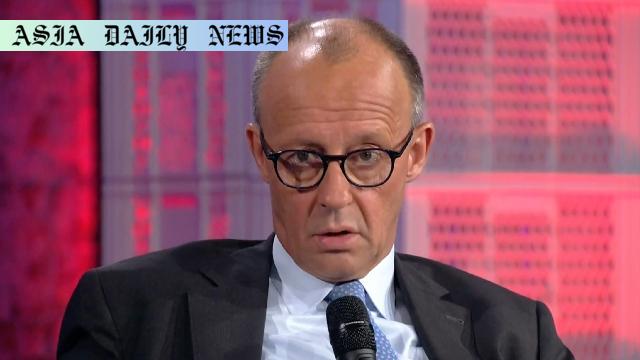Ukraine poised to use German-supplied weapons for long-range operations into Russian territory, signaling a major policy shift.
Germany allows Ukraine to use German-supplied weapons for long-range operations into Russia.
Chancellor Merkel adopts a more assertive posture compared to predecessor Olaf Scholz.
Germany will align with the US, UK, and France on long-range missile support for Ukraine.
Potential shift in stance on providing Taurus missiles with a range of 500 kilometers remains uncertain.

Introduction: Germany’s Bold Decision on Weapon Usage by Ukraine
In a significant shift in foreign policy, German Chancellor Friedrich Merz has made a groundbreaking announcement that Germany will now permit Ukraine to utilize German-supplied weaponry for long-range attacks targeting Russian territory. This decision comes amidst heightened geopolitical tensions and ongoing stalemates in the conflict between Ukraine and Russia. Germany’s evolving stance underscores its commitment to supporting Ukraine steadfastly, despite potential risks of escalating the conflict further.
Germany’s Strategic Coordination with Allies
Chancellor Merz has emphasized that this bold move will be coordinated closely with Germany’s allies, including Britain, France, and the United States. All three nations are already supplying Ukraine with long-range missile systems, and the added support from Germany sends a strong signal to the Kremlin. Such multilateral efforts not only strengthen Ukraine’s position but also illustrate a united front among Western nations in opposing Russia’s actions.
A Departure from Scholz’s Cautious Approach
The decision represents a stark departure from the policies of Merz’s predecessor, Olaf Scholz. Scholz adopted a cautious approach, refraining from supporting Ukrainian strikes deep into Russian territory to avoid escalating the conflict to dangerous levels. Merz, however, appears more willing to take calculated risks, signaling that Germany intends to play a more active role in pressuring Russia to negotiate a ceasefire or de-escalate hostilities.
Implications of Allowing Long-Range Attacks
While Merz refrained from specifying whether the authorization would encompass Germany’s sophisticated Taurus missiles, which have a 500-kilometer range, the announcement paves the way for such a possibility. If Taurus missiles are indeed provided, Ukraine could greatly enhance its strike capabilities, potentially targeting high-value Russian assets far beyond the immediate battlefield. However, this raises questions about the long-term implications — could this lead to retaliatory measures by Russia or a broader conflict on European soil?
The Role of Domestic Politics
Domestic political dynamics may also play a crucial role in shaping the implementation of this policy. Merz’s coalition includes members of Scholz’s party, who may not fully endorse this aggressive shift. Balancing internal political pressures with the demands of international allies and the realities of the battlefield will be key for Merz’s administration as it navigates this complex and unprecedented situation.
Conclusion: A New Chapter in Europe’s Role in the Conflict
Chancellor Merz’s announcement signifies a pivotal moment in the West’s approach towards the Ukraine-Russia conflict. By lifting restrictions on the range of weapons supplied to Ukraine, Germany takes a definitive step toward supporting Ukraine’s sovereignty and territorial defense. While risks remain, this policy underscores Germany’s dedication as a significant NATO ally. Still, the decision’s full impact — both militarily and diplomatically — remains to be seen as the situation unfolds.



Commentary
Germany’s Decision: A Calculated Risk or a Gamble?
Chancellor Friedrich Merz’s decision to allow Ukraine to utilize German-supplied weapons for long-range strikes against Russia demonstrates boldness and conviction. This pivot marks not only an end to Germany’s previously cautious stance but also its increased willingness to confront Russia’s aggression. By enabling Ukraine to extend its operational reach, Germany is unequivocally signaling its solidarity with Ukrainian sovereignty. Yet, this raises crucial questions: Is this move a calculated risk aimed at expediting peace negotiations, or could this inadvertently draw Europe into deeper geopolitical conflict?
Balancing Unity and Internal Pressure
While Merz’s approach aligns Germany closer to its Western allies, it also demands dexterous political maneuvering domestically. Given that his coalition includes members of Scholz’s party — which formerly emphasized cautious diplomacy — the path ahead is far from devoid of hurdles. Convincing skeptical members of his own government while maintaining public approval will require a delicate balancing act. Moreover, public opinion may shift depending on the visible effects of this new strategy in the conflict.
The Broader Context: Implications for European Security
From a broader perspective, Germany’s announcement reflects a united European resolve to uphold international law and territorial sanctity. However, empowering Ukraine with long-range weaponry intensifies the stakes in this simmering conflict. Both supporters and critics of this policy must grapple with a shared concern: the possibility of escalation. While Merz’s decision holds potential to pressure Russia into meaningful negotiations, the risks of retaliation or wider involvement by other states cannot be ignored. Ultimately, this policy encapsulates both hope and uncertainty for Europe’s role in fostering global stability.